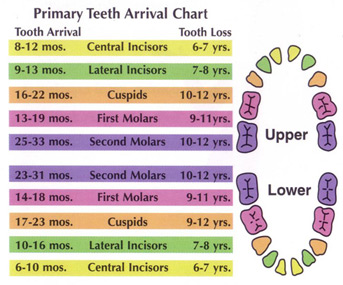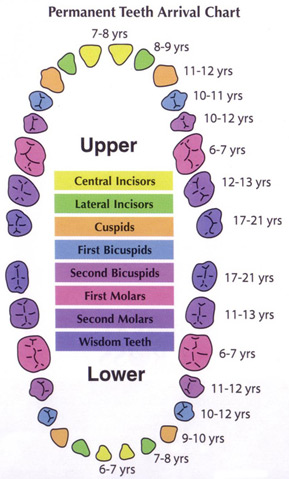Your child’s first set of teeth are called “primary teeth”. These teeth are important. They assist in a child’s chewing abilities and speech development. They also act as “space-savers” in the jaw for the positioning of permanent teeth. Maintaining the health of their primary teeth may reduce the need for future orthodontic work. More importantly, a strong, beautiful smile helps your child to develop good self-esteem.
Children’s teeth are often exposed to unique and inherent problems. Left uncorrected, they can become serious.
Infants and young children often suffer what is known as “Baby Bottle” tooth decay. This occurs when sugary liquids found in milk, formula or fruit juices are exposed to the teeth for long periods of time. When asleep saliva decreases. This allows these sugars to pool around the teeth. The mouth’s bacteria uses these sugars to create acids that damage teeth. Your child’s teeth should be checked on a regular basis for any brown spots which may mark the onset of tooth decay. Regular brushing should start with the first tooth but it is a good idea to clean your child’s gums with a washcloth even before the teeth appear. To avoid baby bottle decay, do not let your child sleep with a bottle.
In most cases thumb sucking is not harmful and most children will outgrow it by age 5. It becomes a problem when it is allowed to continue while permanent teeth are developing. The jawbone in children under the age of 8 is still soft and pliable. Thumb sucking can reshape the jaw and cause mis-alignment. Upper teeth will flare outwards while lower teeth are forced inwards.
If a child is having difficulty quitting, you may want to set up a rewards program for each time or day that they do not suck their thumb. If you are still having difficulty, your dentist can place an appliance in your child’s mouth that should end the thumb sucking within days.

Good dental hygiene and health in the early years will help your child develop a positive relationship with their dentist and may avoid extensive dental work in the future. To avoid any negativity associated with tooth decay, in addition to proper brushing and dental cleanings you may want to consider “Sealants”.
A Sealant is a clear, acrylic-like material that bonds with the tooth to help shield out the decay causing bacteria. They are a safe, painless and low cost way to protect your child’s teeth. They are usually applied to molars since the pits and fissures of the molars are the most likely locations for cavities. Sealants should be applied when the first permanent molars (6-7 years) appear and again when the second permanent molars (11-13 years) appear. They need to be applied before the decay process begins.
In cases where they is a high risk of tooth decay, sealants may be applied to primary molars as well. Since primary teeth are “space-savers” for future permanent teeth, losing them to tooth decay may cause future orthodontic problems. Have your dentist assess whether or not sealants are warranted for your child.
An Orthodontist diagnoses and treats problems associated with the positioning of the teeth. Crowded, crooked or mis-aligned teeth can cause problems with speech, tooth decay, joints, gum disease and/or may cause teeth to be chipped or lost. It is generally recommended that children have an Orthodontic assessment by the age of 7. Since the jaw bone is still soft and pliable up until the age of 8, early assessments allow for corrections in alignment which may be much more difficult to correct later.
Generally, the first visit includes an overall assessment of your child’s teeth and gums. Your dentist may want to take x-rays to examine facial bones and search for hidden decay. They may also recommend a cleaning and fluoride treatment.
You can consider bringing your child to see a dentist as early as 6 months of age but it is recommended that their first dental visit be no later than age 1. Preparing for these early experiences reduces the likelihood of your child becoming dental phobic.
After their initial visit, it is recommended that children visit their dentist every 6 months. Establishing good dental habits and positive experiences early, is important for your child’s long-term dental health.
